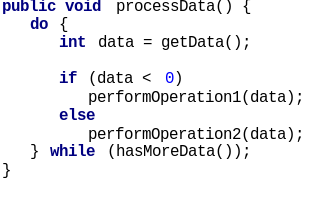
A quine is a computer program which takes no input and produces a copy of its own source code as its only output. The standard terms for these programs in the computability theory and computer science literature are "self-replicating programs", "self-reproducing programs", and "self-copying programs".
In computer programming, lazy initialization is the tactic of delaying the creation of an object, the calculation of a value, or some other expensive process until the first time it is needed. It is a kind of lazy evaluation that refers specifically to the instantiation of objects or other resources.
Lex is a computer program that generates lexical analyzers.
Visual Basic .NET (VB.NET) is a multi-paradigm, object-oriented programming language, implemented on the .NET Framework. Microsoft launched VB.NET in 2002 as the successor to its original Visual Basic language. Although the ".NET" portion of the name was dropped in 2005, this article uses "Visual Basic [.NET]" to refer to all Visual Basic languages released since 2002, in order to distinguish between them and the classic Visual Basic. Along with Visual C#, it is one of the two main languages targeting the .NET framework.
In computer programming, standard streams are preconnected input and output communication channels between a computer program and its environment when it begins execution. The three input/output (I/O) connections are called standard input (stdin), standard output (stdout) and standard error (stderr). Originally I/O happened via a physically connected system console, but standard streams abstract this. When a command is executed via an interactive shell, the streams are typically connected to the text terminal on which the shell is running, but can be changed with redirection or a pipeline. More generally, a child process inherits the standard streams of its parent process.
The C preprocessor or cpp is the macro preprocessor for the C and C++ computer programming languages. The preprocessor provides the ability for the inclusion of header files, macro expansions, conditional compilation, and line control.

In computer science, a syntax error is an error in the syntax of a sequence of characters or tokens that is intended to be written in a particular programming language.
A Perl module is a discrete component of software for the Perl programming language. Technically, it is a particular set of conventions for using Perl's package mechanism that has become universally adopted.

The syntax of the Java programming language is the set of rules defining how a Java program is written and interpreted.
In software engineering, dependency injection is a technique whereby one object supplies the dependencies of another object. A dependency is an object that can be used. An injection is the passing of a dependency to a dependent object that would use it. The service is made part of the client's state. Passing the service to the client, rather than allowing a client to build or find the service, is the fundamental requirement of the pattern.
In computer programming, an entry point is where the first instructions in a program are executed, and where the program has access to command line arguments.
In mathematics and in computer programming, a variadic function is a function of indefinite arity, i.e., one which accepts a variable number of arguments. Support for variadic functions differs widely among programming languages.
IP Pascal is an implementation of the Pascal programming language using the IP portability platform, a multiple machine, operating system and language implementation system.

Modern C++ Design: Generic Programming and Design Patterns Applied is a book written by Andrei Alexandrescu, published in 2001 by Addison-Wesley. It has been regarded as "one of the most important C++ books" by Scott Meyers.
Ateji PX is an object-oriented programming language extension for Java. It is intended to facilliate parallel computing on multi-core processors, GPU, Grid and Cloud.
In computer programming, string interpolation is the process of evaluating a string literal containing one or more placeholders, yielding a result in which the placeholders are replaced with their corresponding values. It is a form of simple template processing or, in formal terms, a form of quasi-quotation. String interpolation allows easier and more intuitive string formatting and content-specification compared with string concatenation.
Charm is a computer programming language devised in the early 1990s with similarities to the RTL/2, Pascal and C languages in addition to containing some unique features of its own. The Charm language is defined by a context-free grammar amenable to being processed by recursive descent parser as described in seminal books on compiler design.
In software engineering, the module pattern is a design pattern used to implement the concept of software modules, defined by modular programming, in a programming language with incomplete direct support for the concept.

Kotlin is a cross-platform, statically typed, general-purpose programming language with type inference. Kotlin is designed to interoperate fully with Java, and the JVM version of its standard library depends on the Java Class Library, but type inference allows its syntax to be more concise. Kotlin mainly targets the JVM, but also compiles to JavaScript or native code. Kotlin is sponsored by JetBrains and Google through the Kotlin Foundation.
In object-oriented programming, forwarding means that using a member of an object results in actually using the corresponding member of a different object: the use is forwarded to another object. Forwarding is used in a number of design patterns, where some members are forwarded to another object, while others are handled by the directly used object. The forwarding object is frequently called a wrapper object, and explicit forwarding members are called wrapper functions.





